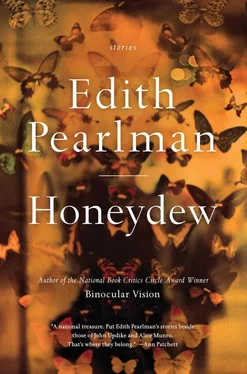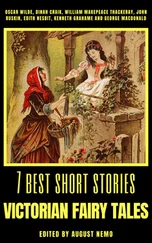“Of late we have not been miserable,” Ben allowed.
“So happy,” she said again.
He refrained from further comment.
“But would you mind terribly if I left a bit earlier than we’d planned? Say, just before Labor Day weekend? Because I have an invitation.”
He examined his heart. Certainly there was a twinge. “An invitation? From that self-centered jackass you see at school, I suppose. He’s back from abroad?”
“His family has the loveliest house at the Vineyard. Would you mind, Ben?”
Well, would he? Her eyes glittered at him. Oh, the darling. “I’ll mind a little,” Ben said truthfully. “But I myself have an invitation to Fire Island,” he lied. “So go, sweetheart.”
“Come sit beside me,” came her soft voice.
He found his way to the glider. He slipped an arm around her shoulders. “‘What we did had a consecration of its own,’” he whispered.
“Poor Hester.”
“We have been happy here,” he said.
“Like an old married couple,” she said.
“Or a brother and sister.”
“It’s the same thing. The best marriages have a strong incestuous component.”
“Is that so?” he murmured into the side of her neck.
“That’s so. The best marriages have complementarity rather than similarity. The best marriages have a sense of the past as well as a sense of the future. The best marriages—”
“The best marriages,” said Ben, suddenly enlightened, “have a maid.”
Frieda hated to cry. Instead she was baking a Queen of Sheba cake. “I thought you’d get married,” she loudly complained, “and here you are splitting. You’ve ruined my summer.”
“Shh,” Amanda said. “Ben is trying to work.”
Ben, in the living room, sent up a corroborating clatter on the keys. Then he resumed his eavesdropping.
“…madwomen in the family, and certain inherited disorders in Ben’s,” Amanda was explaining. “Gingivitis, that sort of thing. No, no, it would have been impossible. Not to mention illegal, Ben being already married to my aunt.”
“Shove it,” Frieda said.
“The place looks wonderful,” Amanda went on. “I hope the Cunninghams are grateful. We certainly are. We’ll miss you.”
“Won’t you miss each other?”
“Oh, excessively!” said Amanda, forcing Ben the didact to shout, “Exceedingly!” after which he rushed into the kitchen and with promiscuous joy embraced both girls.
Boys are such boys,” Marcie moaned. “Adolescent, locked into latency, infantile.”
“Neonatal?” said Sallyann.
Marcie ignored her. “Oh for an experienced man. Minimum age twenty-five. Others need not apply.”
She was lying on the floor looking at the ceiling lamp. Its glow made the porch seem an amber cube, floating alone in the night. Sallyann’s mother wished that the cube would detach itself from the house; from the town of Godolphin; from the entire state of Massachusetts; from the globe. She wished that the porch and its five passengers, herself included, would sail off to Noplace, or at least Elsewhere…
“I’d like a pianist,” June was saying, her fingers trilling on her bare thighs. She herself played the cello. “The Beethoven piano and cello sonatas,” she explained, “the Dvořák…”
From the creaking old glider Helen spoke. “I want to be…taken care of,” she said. Her voice was hesitant — dependency was already going out of fashion.
“My ideal mate,” Sallyann said — she paused for effect, taking off her glasses, putting them back on—“will speak French, raise horses, solve mathematical paradoxes in his spare time, and write poems, paying strict attention to meter.”
They were inebriates, thought Sallyann’s mother. They were invaders. There were a hundred of them, a thousand…
But in fact there were only four, one her own daughter; and they were drinking unadulterated iced tea. She herself had made the tea. They were eating cookies she’d made too, though Marcie was only nibbling, having declared that shortbread was an invention of the devil and could permanently ruin her waistline. Marcie’s waistline measured eighteen inches.
Helen, narrow-shouldered and wide-hipped, ate each cookie slowly, without complaint.
June munched and munched.
Sallyann just sipped.
Her mother sighed. Of course these nubile creatures weren’t drunk — not on spirits, anyway. They’d bounced in from a summer movie that ended in a wedding, and they were intoxicated by their renewed belief in Love: ennobling love; love that hurtles toward blissful marriage; love that lasts beyond the grave. A perfect man waited somewhere for every girl, and her agreeable task was to find him.
For every girl, yes. They called themselves girls — this was the 1950s, and they were nineteen. In another few years they’d drop that sobriquet, all except Marcie. Marcie would be a sweetness. Poor Helen no doubt took refuge in nasty imaginings.
June had the face of a pixie — alert hazel eyes, a firm little chin. Her slender five-foot-nine-inch frame was mostly legs, or so her shorts would have you believe. She had performed a solo at the high school graduation two years ago, her long limbs making chaste love to the cello.
Sallyann had messy red hair, a long mouth, and a small nose. Sallyann was…promising, her mother hoped.
And Marcie of the endangered waistline? Golden skin, blue-green eyes, a banner of black hair, and a grin that suggested that you not take these features too seriously — she would age like everybody else, wouldn’t she; she would grow lined and fatigued, wouldn’t she. Yes, she would, the smile assured you — in a century or two. Marcie was the town beauty. But some boys were too awed to ask her for a date.
So she was planning to turn those jeweled eyes toward men of the world.
And Helen was hoping for a strong pair of shoulders.
And June required ten talented fingers.
And Sallyann, God help her — she wanted a Renaissance man. She was still chattering. “I wouldn’t object to a noble profile.”
“Oh!” cried Sallyann’s mother. They all gasped, no doubt fearing a heart attack. “Oh,” she repeated softly, to reassure them. “My darling fools. You dream about musical fellows, brainy guys, masterful ones, sophisticates…Let me tell you something: all cats are gray at night.”
Respectful silence. Then: “What does that mean?” June asked.
Sallyann’s mother struck her left palm with her right. “It means that, by and large, excluding criminals and the feeble-minded and the psychopathic…men are interchangeable.”
“That can’t be true,” Helen said in a tone of dismay; and “Really,” June said in a tone of curiosity; and “Mother,” Sallyann said in no particular tone; and “Lord!” Marcie shouted from the floor. She sat up. “I do beg to differ. There are amusing men, there are learned men, there are tall ones and short ones and ones who can’t stop biting the sides of their nails; and there are—”
“Listen to me,” Sallyann’s mother said.
In those days girls paid polite attention to women. Marcie wrapped her arms around her calves. Helen stopped the glider with a discreet motion of her heel. June on her chair leaned forward and rested elbows on bare knees. Sallyann took off her glasses.
“There are four of you—”
“Four darling fools,” murmured Sallyann.
“—and there are twenty nice young men buzzing around Godolphin. Some are buzzing close to some of you, I’ve noticed. Any of you can make do with any of them. Yes, you can, Marcie.” Four stubborn silences. “Here’s an idea,” she barreled on. “Choose, together, oh, twelve decent fellows. I’ll write their names on little pieces of paper and fold the papers and throw them into a hat. Each of you will pick one paper. You’ll read the name on it…”
Читать дальше












